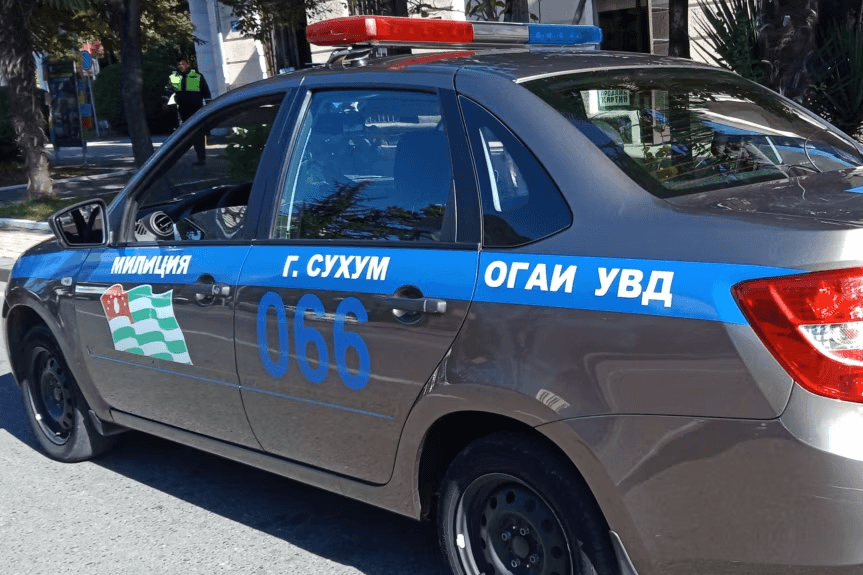
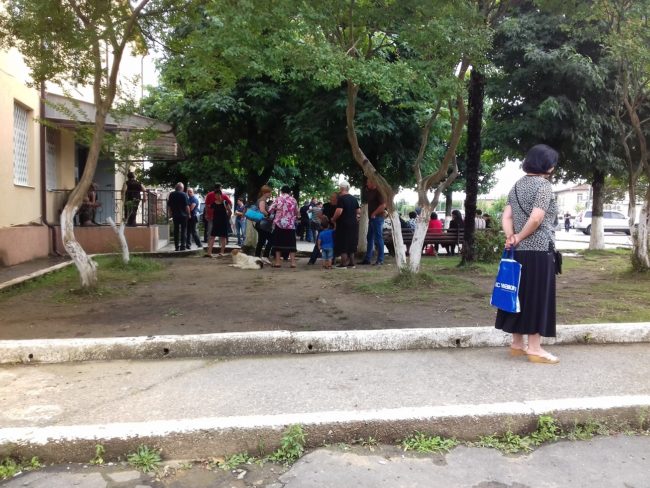
 A string of changes in how identity documents are issued has left residents of Abkhazia’s Gali District feeling frustrated and powerless. OC Media spoke to a number of locals, who complained that widespread corruption and discrimination makes them feel unwelcome in their homeland.
A string of changes in how identity documents are issued has left residents of Abkhazia’s Gali District feeling frustrated and powerless. OC Media spoke to a number of locals, who complained that widespread corruption and discrimination makes them feel unwelcome in their homeland.
The same chaotic picture can be seen every working day in Gali’s police building; the police’s passport section is the only crowded place in town. Residents from all over Abkhazia’s Gali District, which is predominantly populated by ethnic Georgians, come here for one reason — to apply for residence permits. This document is explicitly meant for ‘foreign citizens’.
Because of the problems residents of Gali face in obtaining official documents, there have been long queues here for years. People standing in line complain that they are not treated well. They say staff of the police station are usually rude, never start on time, and if anyone complains, they respond by halting work until there is silence.
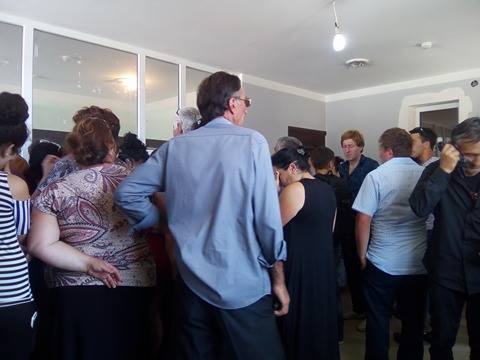
It’s August, and the temperature in the streets is almost 40°C, but residents of Gali District still gather here from early morning, coming by bus or car, just to queue. They must submit their documents to get a new residence card.
Even to enter the building is difficult, even impossible. People complain that a bribe of ₽1,500 ($29) for each document needs to be paid or face weeks of waiting in the queue. Another ₽2,000 ($34) bribe needs to be paid once the documents arrive.
Even if they manage to get a residence permit, this still restricts their right, for example, to buy a new house or other property. This document does not give them the right to vote.
Identity documents
Georgians in Gali say they face many issues because they lack Abkhazian passports, which has been a major problem for them only since 2008. Since then, they have faced restrictions on their freedom of movement, have been deprived of pensions, and yet still pay taxes to the government in Sukhumi. The issue has been heavily debated in Abkhazia, with many criticising the government’s policy as counterproductive for integrating Gali Georgians into Abkhazian society.
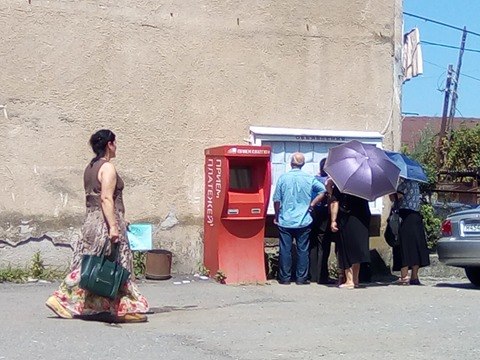
The obligation to take Abkhazian identity documents has been compulsory since 2008, when Russia recognised Abkhazia’s independence — before this, Soviet passports or birth certificates in case of minors were mainly used. After the August 2008 War, many Georgians residing in Gali District held special Form No 9, showing they are residents of the district and giving them certain rights, including to cross the border.
Many Georgians obtained Abkhazian passports at that time, but these were revoked following a 2013 law, according to which only Abkhazian–Russian dual citizenship is allowed. Exceptions are made for ethnic Abkhaz diaspora living abroad.
Since June, even Form No 9 — which now has to be renewed every month, usually for a bribe of ₽200 ($3.50) — have begun to be phased out in favour of new residence permits, which are explicitly meant for ‘foreign citizens’ residing in Abkhazia — based on the Abkhazian authorities’ assumption that almost all Gali Georgians hold Georgian citizenship, which they say poses a security threat.
There are also additional restrictions for inhabitants of border villages, who aren’t allowed to move around — even to visit a neighbour’s house — without a document, such as Form No 9 in their pocket. Otherwise, police have the right to arrest them. The authorities justify this citing security concerns, due to the heavy Russian military presence in the district.
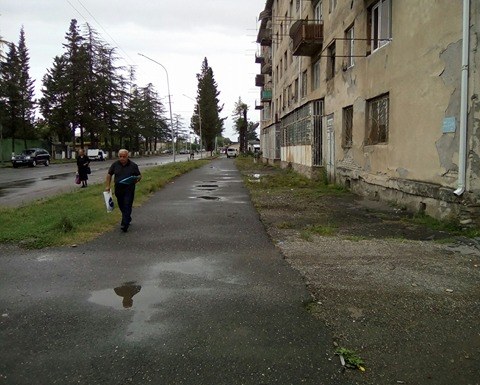
Soviet passports and Form No 9 will become obsolete in 2018, and each resident of the Gali District is expected to obtain either a residence permit or Abkhazian passport in order to stay in Abkhazia.
The head of Gali District, Temur Nadaraya, told OC Media that the previous government was to blame for the protracted process of issuing identity documents, and that due to legislative constraints, the local population was only eligible to receive residence permits.
‘The problem with issuing documents in Gal District has been so protracted because the previous government had violated the constitutional law of the Republic of Abkhazia “On citizenship”, according to which dual citizenship for residents of Abkhazia is possible only with the Russian Federation. Over 96% of residents of Gal District are citizens of Georgia, very many of them have refugee status and returned to their homes after a decree by the first president of Abkhazia, Vladislav Ardzynba. Having foreign citizenship doesn’t give them the right to obtain Abkhazian citizenship right away and they can so far only claim a “residence permit” ’, Nadaraya told OC Media.
‘Corruption at every turn’
Resident of Gali’s Otobaia village, Ia (not her real name) has been waiting with her husband and three children from morning till night in the queue to apply for new residence permits. Ia told OC Media they have been queuing every day for more than two weeks already, with no success. That’s why she has decided to pay a bribe. For five people it will cost ₽7,500 ($130). She says in spite of her family’s financial problems, she doesn’t see any other way. The trip from their village to Gali town and back also costs money.
‘There is corruption here at every turn, we cannot stand it, but what else can we do? What have we been doing these last decades? Nothing but keeping silent. Why are we silent? Because we don’t have any rights here. After receiving this residence permit we will be guests in our country, without rights’, she says.
Ia points her finger to an old man she does not know but remembers from the queue, insisting neither he nor anyone else can receive their documents without paying a bribe.
She says everyone who has entered the building has either paid a bribe or has an acquaintance inside. Ia tells OC Media about a young woman who works in the police station who is running the scheme.
‘She is the one who takes the bribes, almost everyone knows it, but no one can do anything against her because from what we heard, her father fought in the 1992–1993 war against Georgia of course, and after this her father has the title of hero. That’s why she can do whatever she wants’, Ia says.
After all the waiting, she decided to pay the money. She went to a man in front of the police station, talked to him, and then paid the ₽7,500 ($130) for five people. Not even five minutes later her name was called out from the passport section and they went inside. After two hours in the passport office, she and her family submitted their applications.
Asked about the reports of corruption, Temur Nadaraya told OC Media the authorities were aware of the problem and hoped for a rapid improvement.
‘Yes, unfortunately this [the bribes] has had a place. Literally a month ago several people were detained for forgery of documents. The district’s Prosecutor’s Office opened a criminal investigation. We, for our part, obliged the heads of village administrations to personally attend the delivery of documents to the passport office and [we] created a schedule so people don’t have to suffer in queues. Of course, there are still problems with queues, but the Ministry of Internal Affairs is sending more staff [to the passport section] the next week, I hope the situation will improve’, the head of the Gali District told OC Media on 17 September.
Returning to ‘historical Abkhaz ethnicity’
In July, local authorities announced that they would grant citizenship to ethnic Georgians who change their names and register themselves as ethnic Abkhaz. The move has been informed by the Abkhaz narrative that inhabitants of Gali are actually ethnic Abkhaz who over the years have become ‘Georgianised’ and have ‘forgotten their Abkhaz roots’.
[Read on OC Media: Abkhazia to grant citizenship to ethnic Georgians who ‘return to historical ethnicity’]
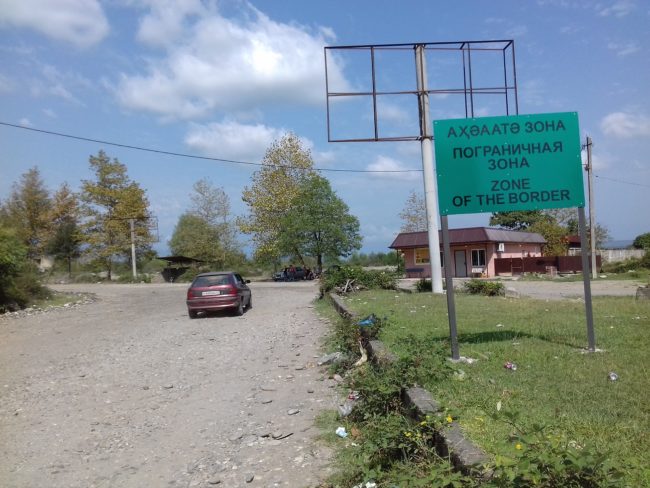
Papuna (not his real name) wants to register as Abkhaz and get an Abkhazian passport. He considers himself Georgian, but says that if he wants to live here, he doesn’t have any other choice. The Abkhazian authorities seized his Abkhazian passport several years ago, and for years it has been impossible for him to cross the border.
‘I was born, have been living, got married, and am working here. The local authorities told us we cannot register new property and so on with a residence card, so how can we live here with such rights? That’s why I made the decision’, he told OC Media.
His brother Merab (not his real name) already has an Abkhazian passport, which he obtained several years ago. He also considers himself Georgian and has Georgian citizenship too. Merab says he worked in an institution in Gali where it was necessary to have an Abkhazian passport.
‘Otherwise I would lose my job. No one “forces us” to take an Abkhazian passport, they just make us do this, they don’t leave us any other choice’, Merab says.
Why Georgians cross the border so often
There are many different reasons why Georgians from Gali cross the border. Most of them visit the town of Zugdidi, which is close to the border. The first reason many give is shopping in Zugdidi’s market; they say everything is expensive in Gali.
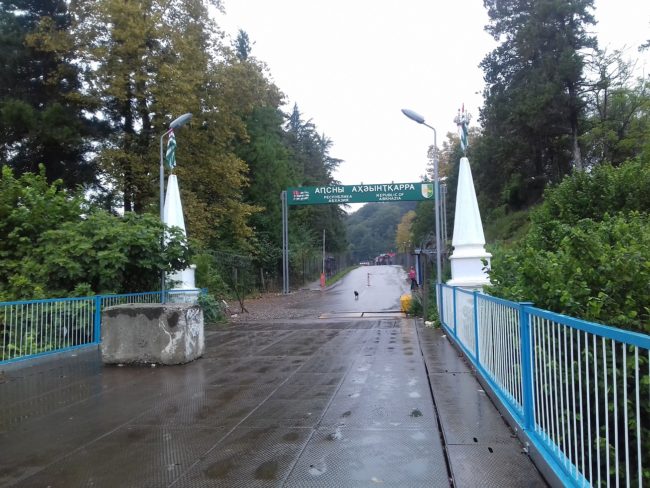
Nargiz (not her real name), 76, says she needs to take medicine to regulate her blood pressure every day. She says the medicine costs ₾1.20 ($0.50) in Zugdidi, while in Gali it is ₽80 ($1.37). She has special Form No 9, which allows her to cross the border, but she says it needs to be renewed every month, which is not simple.
‘When I don’t have a document I must buy the medicine at triple the price. I’m old now and cannot always stand in a queue; sometimes they work, sometimes they don’t. I have a daughter and sometimes she buys it for me, but she has problems with her documents too’, Nargiz told OC Media.
People also cross the border to receive medical care, as there is reportedly a lack of proper medical equipment and qualified doctors in Gali’s hospital, which locals complain is in a dreadful condition.
Finally, people cross over to visit relatives. Given that the 1992–1993 war in Abkhazia forced the vast majority of Georgians to flee their homes, many people have relatives living across Georgia and abroad.
Fewer perspectives
Students from Gali who study or want to pass national exams in Georgian universities complain about the obstruction they face while trying enrol. They say that because of their lack of official documents, they cannot cross at border posts, and must do so clandestinely. A number of students told OC Media that sometimes their universities take into consideration their difficulties, but this is not always the case.
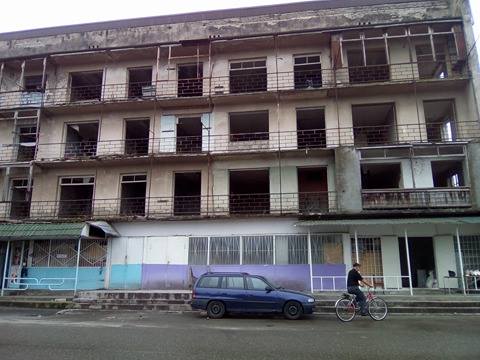
Violeta (not her real name) studies law at Akaki Tsereteli State University in Kutaisi. She thinks she has no chance of progressing her career in Abkhazia, and wishes to work in Georgia; she says she does not want to live in Abkhazia. When asked why, she recalled an incident almost two years ago at the Gali police station.
‘One girl who came to the police station to get a document was thrown out just because she was wearing shorts. The head of the passport section did this, and was shouting at her saying, “you have to know where, to which institution, you are coming to. This is the Caucasus” ’, recalls Violeta.
Almost two month ago, Violeta’s brother, who is only 17, was captured by Russian border guards as he and a classmate attempted to cross the border clandestinely. According to Violeta, the pair did not have any documents.
‘They had been preparing for national exams and used to go this way. They wanted to continue to study at Georgian universities. We were so afraid because the Russians beat them. When my mother saw them she fainted, they weren’t allowed to go home even after we paid a fine’, Violeta said.
Young people in Gali who want to study in Georgian universities usually go to Zugdidi to prepare. Because of the lack of Georgian language classes in schools in Gali, many have to take private lessons.
The students OC Media spoke to say that they don’t like to cross the border in a clandestinely, but when they don’t have a passport, they have no other choice.
There is a bad situation with youth unemployment in Gali, so many do not return after studying in Georgian universities.
Many parents also complain it has become increasingly difficult to take their children to Georgian schools across the River Enguri. In March, the Abkhazian authorities finished closing down all border checkpoints with Georgia except the main one, on the Enguri Bridge.
Still, parents argue that they have no other choice, as the Abkhazian authorities abolished Georgian-medium schools in 2015, with all subjects now being taught in Russian from the first grade — a language which is alien not only to the majority of children, but also to many teachers and parents.
All place names and terminology used in this article are the words of the author alone, and may not necessarily reflect the views of OC Media’s editorial board.






